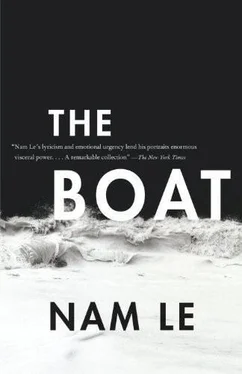Sarah started. She hadn't known about any brothers.
This was the war, Parvin went on, where thousands of boys cleared minefields by walking over them, clutching plastic keys to heaven. Where soldiers died in Iraqi chemical attacks because the beards they had grown to demonstrate their faith made it impossible for them to achieve proper seals with their gas masks. Parvin fell silent. She made no more mention of her brothers.
They were sitting in one of the villa's upstairs studies. Outside the window a busted streetlamp flashed, at long intervals, on and off. Sarah only noticed when the brightness was doused — the world steeped a grade darker.
Meanwhile, said Parvin, they were bombarded in Tehran not only by missiles but by announcements, victory marches, all extolling the glories of martyrdom. This was 1988. One day, a bomb razed their neighbors' apartment building. Her best friend lived there, and her cousins' family. She rushed over but already — even before the ambulances arrived — the wreckage had been blocked off by basiji in their red headbands. They barked out propaganda from their motorbikes. Parvin ran forward but was immediately knocked to the ground. Her ears were still ringing from the explosion. No one moved to help as one bike after another skidded inches from her head, spraying dirt and dust into her face. No crying ! they shouted. Death to Saddam ! they shouted. Death to America ! It was in that moment, Parvin said, that she'd known she would have to get out of the country. The decision tormented her — her parents had already made it clear they could never leave their homeland. Her own loyalty, however, was used up. Or maybe it was greater than theirs. She didn't care where she went — to America, if those devils reviled it so much. All she knew was that she couldn't allow this place any further claim over her.
By the time Parvin finished her account, night had fallen and the broken streetlamp lit their room in long, freakish strobes. The wind had picked up and the dark world outside now seemed suggestive of peril: window boards banging against frames, cans scraping themselves jerkily, as though injured, across the roads. Looking up, it was unnerving to Sarah how fast the clouds seemed to move across the nimbus of the moon.
Parvin murmured, "I'm sorry about what happened at the meeting."
Sarah shook it off. She glared at Parvin. "Why didn't you tell me?"
"I didn't want to be defined by it. The exotic friend with the traumatic past." Parvin switched on a lamp. "You know how it is. Especially now."
"But your brothers."
Parvin averted her gaze.
"Your sister. I'm your friend. You could've told me."
A strange, abstracted pity sought its level within Sarah. For years she'd yearned to hear this story-this missing piece of Parvin's past — but now that she had, she felt no closer to her. She was confused. Hadn't she come here, in part, to make sense of Parvin's choices? And didn't this — the deaths of her brothers — now offer up that final sense?
"My sister?" Parvin looked blank, then started bemusedly to smile: "Roya? She's not-she was married to my elder brother." She broke off. "I've never really known her."
Outside, the wind squalled harder, skimming water up from unseen surfaces and spraying it through the shutters. Parvin got up and closed the window. Sarah saw her face, as she did so, setting inwardly.
Parvin turned around. "They all talk about needing to be here," she said. "But I was here."
In a way, Sarah envied them their pasts — Parvin, Roya — joined even by atrocity and privation, a shared past of such moment that they'd been forced, in separate ways, to flee from it. Mahmoud, who could reach meaningfully back to mythic battles. What did Sarah have? A childhood dim and distant, a thing half chewed and incomplete as though first used up by someone else. Memories of her parents, their rubbed-out faces. Only Paul remained — his vividness constant, hurtful, taunting. He walked into a room and stood still. Her past had never offered her any real excuses.
"Anyway," said Parvin, "they're all hypocrites. They'd all get out if they had the guts."
Sarah hesitated. She thought of what Roya had said earlier. "Things are really that bad?"
"They've lost their nerve, is what it is. I'm so sick and tired of all this consultation. All this uprising by committee. All we do is hedge and prevaricate. The other side doesn't prevaricate. Ask that thirteen-year-old girl if they prevaricate."
She was speaking now as though to an interviewer — as though into a microphone or megaphone. Pacing the small study in consternation. Her two brothers, Sarah reminded herself, had vaporized on the western fields — but already that seemed too easy an explanation. She wanted a deeper sense. Parvin had left here young — returned of age, zealous and single-minded. All those prodigal years in Portland — the biggest part of her life- what had they meant to her? Had they been anything more than personal wilderness? And what, then, of Sarah?
"Look at what they do," Parvin said. "And we let them get away with it. We bend over backward — just to not offend their religious sensitivities. And the women" — she splayed open her fist in disgust — "all talking about equal rights, equal legal status, under sharia law. Under an Islamic state. All bullshit."
An image of Mahmoud came into Sarah's head: his two fingers pointing up vatically, like a mock gun, while he preached. She asked, "Do they know? The drama group?"
"Know what?"
"That you're not putting on their play."
Parvin considered her curiously. "If they want to put it on, who's going to stop them?" A gust of wind leaned against the house, creaking the walls in their joints. Parvin dipped her chin, then vigorously shook her head as though to cut short Sarah's protests. "So maybe they won't do it on the stage. Or as part of the official program."
"I just don't understand," Sarah burst out, "what it's meant to do."
Parvin stared at Sarah. Her mind shifting through its reactions.
Sarah said, "If the play's only going to antagonize people, religious people — "
"Remember the parade today?"
"During their most important religious holiday — "
"All those religious people, mourning together, right? Devout." Parvin squared round to face her. "Except — when you're in it, you realize it's more than that. I'll tell you what it is. It's sexual. That's how these things work here. All day, every day — it's don't do this, don't do that. Then — in God's name — step into one of these things and cop a feel." She strained, strenously, intricately, for the words. "It's all a con," she said. "Step in — then step out and tighten your veils."
Sarah had been holding her breath. Now, as she let it out, she. sensed that a mood in her head had cooled and hardened. "You know," she said, "what you're doing. All this. It doesn't mean anything to me." Her own calmness surprised her.
Parvin stopped, turned away from her. "Listen," she said. She took hold of her voice. "It's a shock at first, I know. But you'll see. Thursday — "
"I want to understand," Sarah continued, "I do. That's why I came here. But it doesn't make sense to me, not emotionally, not even in an intellectual way."
Parvin stood still for a while, then went over to the window and looked out. Wind, on the other side of the glass, absorbed the light, released it. From somewhere in the house rose the scent of burnt tea. Sarah waited, feeling the grief of a bygone situation, the deep-seated loneliness, well up into her like a drug. She'd made her choices years ago. They both had. How could they think to undo them now?
"Is this about Paul?" said Parvin.
Sarah didn't say anything.
Parvin thought for a moment, then said, "We can talk about it. Let's talk about it."
Читать дальше











